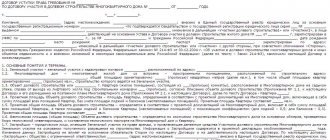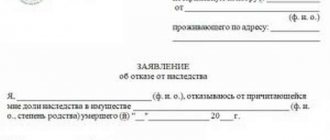What types of inheritance are provided for by civil law?
For one or several heirs, inheritance is possible both by law and by will. If there are testamentary dispositions of the deceased owner of the property, everything is relatively simple: as the testator distributed the property, so it is inherited. The exception is the obligatory share in the inheritance.
The situation is different when the testator has not distributed the property in the will. Here we have to divide the property according to the law. And this is where the largest number of lawsuits arise, since there will always be people who disagree with the division of the inheritance.
Division of a privatized apartment
The key to quick distribution of property lies in agreement between the heirs. In its absence, each of the heirs can file a claim with the judicial authorities.
Most often, the court distributes the shares equally among the first-degree heirs. Sometimes the court allows the possibility of redemption of a share by one of the priority heirs after the death of the testator. Citizens who were directly related to the apartment privatization agreement can be attributed to this group of individuals.
The easiest way to obtain the right to dispose of property after the death of the heir is if the person registered in the apartment is the only heir. To enter into rights under the law, it is necessary to prepare a certificate indicating the possibility of receiving an inheritance.
The future owner of the apartment must obtain the appropriate certificate from the Federal Registration Service; without it, the heir will not be able to sell the property or rent it out. Even in the absence of obvious debts, it is necessary to check the deposit on the apartment.
Expert opinion
Makarov Stanislav Tarasovich
Legal consultant with 8 years of experience. Specialization: criminal law. Extensive experience in document examination.
There may be no debts for utilities, but the testator could have time to perform other actions with the apartment during his lifetime (in the case of writing a will and not a deed of gift).
To inherit a privatized apartment, it is necessary to establish its real market value. To do this, you need to contact independent real estate appraisers. If there are several heirs, valuation activities are carried out in shares in accordance with each new owner.
When reviewing the rules of wills, you must always remember that there are certain exceptions to the rules of inheritance. For example, a testator can never restrict the following citizens from receiving property:
- disabled people;
- dependents;
- disabled people;
- young children;
- disabled citizens.
Each of the above citizens can always claim a part of the inheritance, regardless of whether the heir left a will or not.
What is the order of entry into inheritance rights provided by law?
Among the first to claim their rights to the inheritance mass are sons and daughters, mothers and fathers, as well as the surviving spouse of the testator. Grandsons and granddaughters can accept an inheritance only if their parents died before accepting the inheritance.
The second to inherit are the grandfather, grandmother, brother, and sister of the owner of the property. By right of representation, the children of the brother or sister of the deceased inherit here.
The third level of inheritance is represented by uncles and aunts of the owner of the property, and cousins inherit in the event of the death of their parents who did not have time to properly formalize their inheritance rights.
The fourth stage consists of the parents of the grandparents of the deceased.
The next step is the testator's great-uncle or great-aunt, as well as a first-cousin grandson or great-great-aunt.
The penultimate degree of kinship is first cousins, great uncles or aunts, first cousins, great-grandsons and great-granddaughters.
The last, seventh line of heirs are persons not related by blood, such as a stepfather, stepmother, stepdaughter or stepson.
How to register succession
To enter into an inheritance, regardless of the grounds, you must follow the established procedure.
To do this, perform the following actions:
- To obtain a certificate of inheritance, an application of a certain sample is submitted to the notary. This can be done in person, through a representative with a power of attorney issued in his name.
- Actual possession and use of property; measures aimed at its preservation and expenses incurred in connection with this will confirm the acceptance of succession.
To register an apartment by inheritance, you must provide the following to the notary office:
- The death certificate is obtained from the registry office (civil registry office).
- Documents confirming blood relationship or relationship with the deceased.
- Extract from Rosreestr about real estate.
- A paper from the management organization confirming that there is no debt for utilities and housing services.
Evidence includes documents from the registry office, court decisions and, if available, extracts from birth and house registers, certificates from the place of work.
The death of a loved one is a serious blow for relatives. After such a blow, they may not immediately think about inheritance. But this procedure is mandatory and you need to go through it. Next, we’ll tell you how to register the deceased’s share in a privatized apartment
.
When must successors take over their inheritance rights?
His heirs are given only six months to claim rights to the property remaining after the death of a relative. It is during this period that they are obliged to formalize everything properly, i.e. prepare all documents, pay taxes (if applicable) and state fees.
ATTENTION !!! If suddenly the heir cannot meet the allotted deadline, he is deprived of the right to inherit. And other applicants will divide his share among themselves. The term can be restored only for a valid reason. And this is done either by agreement with other heirs, or in court. But it is not a fact that the heirs will want to share or the court will recognize the reasons for the omission as worthy of leniency.
Therefore, it is better to formalize your right to the property remaining after the death of the testator as quickly as possible. To do this, you need to contact the state notary office at the place of last residence of the deceased relative with a written application. Each heir applies personally. There is no collective application for acceptance of inheritance.
Stages of inheriting a privatized apartment
Inheritance of a privatized apartment after the death of the heir, according to the law, requires compliance with five stages:
- within six months after the death of the heir, prepare the entire list of papers that prove the right to receive property;
- officially open a legal inheritance case at a notary’s office;
- register all the necessary papers with a notary, the new bill will help you understand the registration procedure;
- obtain a certificate that confirms the right to own property by inheritance;
- register your own rights for further disposal of the property of a deceased person.
The key to successful completion of the process depends on the speed of completion of each of the above points. The State Duma restricts heirs from freely obtaining rights to property after a six-month period, so all rules must be followed promptly.
Even first-priority heirs go to court to restore their own rights six months after the death of the testator. In this case, receiving a share from the property of the deceased is possible only by decision of a judicial commission.
What documents are attached to the application for accession to your inheritance rights?
In order to support the data set out in the application, the notary is presented with:
- a copy of the passport of the applicant for the inheritance (the original is presented for comparison);
- two copies of a certificate confirming the death of the testator. There is one nuance here. The civil registry office issues one death certificate. Accordingly, it will be in the hands of one heir. Other applicants for the remaining property may receive duplicate certificates. But, as a rule, an inheritance case is opened by a notary after one of the legal successors presents the original certificate certifying the fact of death. In this case, the remaining applicants for the inheritance attach only copies to the application;
- a certificate stating where the testator lived in the last days of his life (original and copy);
- the original plus a copy of a certificate indicating who is registered in the same residential premises as the testator;
- documents indicating the degree of relationship between the heir and the owner of the property.
The notary may also request other documents (for example, a copy of the house register). There is no need to overreact to this, the notary is within his rights.
How to correctly accept a privatized apartment as an inheritance?
Inheriting a share in a privatized apartment involves determining the circle of heirs of various orders. Inheritance involves the transfer of ownership of property from one individual to another. It is also assumed that shares will be distributed among close relatives of the deceased person. According to the law, after the death of the testator, the degree of relationship is of great importance.
First priority heirs have the right to be the first to claim the property of a relative after his death in the absence of a will. Heirs of the second stage have the right to claim inheritance according to the law in the absence of relatives of the first stage.
If there is a will, the distribution of shares between relatives occurs according to the rules of the document, that is, following the last will of the deceased person. The key to successful inheritance lies in the sequence of actions, the professional work of the notary and the availability of all necessary documents.
inheriting a privatized apartment not always a simple and accessible process; a new bill that regulates exceptions to the rules of inheritance is of great importance in this matter.
3 ways to get a free legal consultation 01
-consultant in online chat bottom right
Request a call back (bottom left button), a lawyer will call you back in 10 minutes
How are the debts of the deceased divided among the heirs?
The principle of universal succession applies to inheritance. This means that only property and rights cannot be accepted. Property and rights almost always come with obligations. And these obligations cannot be abandoned. Only those obligations that were closely related to the personality of the author are not transferred (for example, the obligation to write a work under an author’s contract or to pay child support).
All other obligations are distributed among the applicants. If everyone received an equal part of the testator’s property, then the obligations are also divided equally. In cases of unequal division of property, more debts go to the person to whom the bulk of the inheritance is transferred.
IMPORTANT !!! Liability for the obligations of the deceased owner of the property is assumed to be joint and several. That is, the creditor can demand from any of the heirs the full fulfillment of the obligation, or can appeal to everyone equally.
Moreover, even if the heir has fulfilled his part of the obligation, he still remains a joint and several debtor. This continues until the others fulfill their part of the obligations.
If one of the legal successors pays in full all the debts of the testator, then he receives the right to claim compensation from the other heirs (minus his share of the obligation).
Preemptive rights when dividing property between heirs
The heir who, together with the testator, had the right of common ownership of an indivisible thing (for example, a surviving spouse) has a priority right to receive this thing when dividing the inheritance over those heirs who were not participants in the common property (regardless of whether they used such property ). And the heir who constantly used the indivisible thing has an advantage over those who did not use it on an ongoing basis and were not a participant in the common ownership of it.
The issue of dividing an apartment is especially relevant. As a rule, dividing such premises in kind is impossible. Therefore, the Civil Code of the Russian Federation established a preemptive right to receive such residential premises against inherited shares, provided:
- residence in this premises on the day of opening of the inheritance
- lack of other residential premises for living
- other heirs are not the owners of such premises.
These rights also apply to a residential building, which for some reason cannot be divided in kind.
When dividing property, the heir who lived with the testator on the day of opening of the inheritance has the right to receive items of home furnishings and household items in a preferential manner as part of his own share.
When exercising the preemptive right, the disproportionality of the share is eliminated by the transfer of other property and (or) the provision of other compensation, incl. monetary. In this case, compensation must be provided as a general rule before concluding an agreement on the division of inheritance.
This is how the division of an inheritance looks in general form, how the inheritance is divided between heirs in specific life circumstances - it requires taking into account many factors, information about which we have posted in this article and on the website.
Clarifying questions on the topic
My uncle sold the house. The amount from the sale was divided as follows: half for him, and half of his wife, who died 2 years ago, was divided between him, his daughter and the children of his son, who died last year.
In 2021, on December 29, my uncle dies. He has one third of half in his savings book for the sale of his wife's house.
The uncle gave half of the amount he received from the sale of the house to his daughter, with whom he had recently lived. My question is: what portion is to be divided after his death?
The money that is in his bank account at the time of his uncle's death is subject to division among the heirs. Article 1112 of the Civil Code of the Russian Federation: the inheritance includes things and other property that belonged to the testator on the day the inheritance was opened, including property rights and obligations.
There are three of us: me and two brothers. In our village there lived a father who, after the death of my mother, married someone else. The stepmother has a son, not hers. After my father’s death, the archive told us that the house was divided into four parts: father, stepmother, her son and me. I did not know that. How is the distribution of shares and why did the brothers not get a share?
You need to obtain the relevant documents to understand what the archivists meant. After the death of the father, an inheritance must be formalized.
Expert opinion
Makarov Stanislav Tarasovich
Legal consultant with 8 years of experience. Specialization: criminal law. Extensive experience in document examination.
The inheritance is divided by law (in this case, the heirs will be the father's wife, you and you will take equal shares) or by will (in this case, the division of the house will be according to the will, which the father drew up with a notary and the brothers may not be included in it).
The division of the apartment, my brother refused the inheritance, now they say that according to the new laws it turns out that he refused only half of the inheritance (from his mother), but it turns out that he did not refuse the father’s part, although he simply wrote a refusal of the inheritance, at that time there were no such distributions. My brother is in a psychiatric hospital, he has not lived in this apartment for a long time, I, my 2 daughters and 2 granddaughters live here.
We want to sell the apartment, are there any options not to share with my brother?
To answer your question, other information is needed. Who was the owner of the apartment, on what basis, when the parents died, who and how accepted the inheritance, what is written in the brother’s application.
How to get a large part of the inheritance if only we have been caring all this time? No receipts were collected, there were many witnesses. The mother did not have time to make a deed of gift.
The inheritance is divided among the heirs of the same line in equal shares. You have the right to recover from the estate only the necessary expenses associated with the mother's dying illness.
My mother inherited half of the apartment, the other half of the apartment is owned by my aunt. Because
The apartment originally belonged to my grandmother. My aunt has been living in the apartment for many years, I can’t even get the keys to this apartment because...
she doesn't give them to me. She does not want to agree on the sale and division.
What legal measures can be taken in this situation?
You can, through the court, demand the removal of obstacles in the use of the property, oblige you to hand over the keys to the front door, or ask the court to move you into this apartment. When selling a share in an apartment, her consent is not required; she will only have a pre-emptive right to purchase.
Half of the apartment belongs to the mother. The second half is divided into 3 heirs of the first stage. What part will it be?
the inheritance between the heirs is divided in equal parts. In your case, each heir is entitled to 1/6 of the share in ownership of the apartment.
The inheritance includes 2 garages and a car. There are three heirs: a wife, two children from the first marriage.
Plaintiffs, children who are demanding in court to give the wife a car (410 thousand rubles) and a garage (300 thousand rubles), a second garage for their daughter (130 thousand rubles), pay her the difference in money (150 thousand rubles), son's share of money (280 thousand)
rub.). The total amount of the inheritance is 840 thousand.
rub., including a car: 410 thousand rubles, garages: 300 thousand.
rub. and 130 thousand.
rub. The wife asks to sell everything and divide it equally.
How will the court divide the inheritance?
The court will divide all property in kind, collecting the difference in the value of the shares. That is, each person receives 1 piece of property, with the owner of the car and the more expensive garage paying in favor of the heir to the garage of lesser value.
When distributing property, the court will be guided by everyone’s personal interest in this property and the ability to use it, as well as the established procedure for use.
Parents died. Their granddaughter and children live in their apartment. Do I have a part of the inheritance, like my son, if the apartment is privatized?
You have the right if you have not missed the deadline for accepting the inheritance.
Aunt died. Have no children. All that remains is an apartment and a dacha. Her 2 brothers and sister remained alive. Aunt is my mother's sister. Can I inherit?
You can enter into an inheritance if the heirs of your predecessors do not enter into the inheritance or refuse to accept it.
Hello. My father died. He and his mother have a two-room apartment in equal shares. He also has an eldest son from his first marriage, whom we have never seen. He filed for Inheritance, that is, 1/6 of his apartment. He is going to sue. What can he do with 8 square meters in this apartment according to the law? He says he will move in the tenants. Thank you
It is not so easy to move in tenants, since the participants in shared ownership jointly own, use and dispose of their property. And in case of a dispute, the court will determine the procedure for using the apartment. He himself will be able to use it and live there.
Good afternoon Mom died in 2021. She lived with her son. I am a daughter, I live separately with my daughter and husband. Mom’s apartment has been privatized for the two of them. She made a will of her share to me. The brother refuses to share the property. What kind of punishment can I inflict on him?
Enter into inheritance through a notary and no special “authority” is needed. If your brother does not want to divide the property in the sense of selling it, notify him of your desire to sell his share (look at shared ownership).
Expert opinion
Makarov Stanislav Tarasovich
Legal consultant with 8 years of experience. Specialization: criminal law. Extensive experience in document examination.
Or determine the procedure for using housing if you intend to move in and live in the apartment. The division of inheritance in most cases entails conflicts, but they can be resolved.
You can use the help of a mediator who will help resolve the conflict and resolve the issue of inheritance division.
How is real estate divided among several legal successors?
As a general rule, if after the death of the testator there are several legal successors, then they become share owners of this property. One of the legal successors may buy out the share of the other heir or offer other property (for example, a car) in exchange for it. If relations between the heirs are normal, they have the right to live in the received living space together. Heirs who have duly registered ownership of the property have the right to sell it and divide the resulting amount among themselves.
In some cases, a physical division of a real estate object into parts occurs. In relation to an apartment, this is practically impossible, since it is supposed to build a separate entrance, bathroom, kitchen, etc. But in relation to private houses, this is often practiced.
IMPORTANT !!! The debts of the testator for utility payments are not transferred to the legal successors, except in the case where the management company filed a lawsuit and the claim was satisfied.
Then the heirs will be forced to pay. But the situation with payments for major repairs is different. They will pass to the heirs in full. If payments for capital repairs are not repaid, the management company has the right to sue the heirs.
Dividing an inherited apartment
Every citizen has the right to write a will indicating all persons and the size of their shares in the inheritance. Such a document is a way to avoid disputes regarding inheritance after death.
Inheritance by will is less common. In most cases, successors become as part of inheritance by law. Let us recall that the main heirs under the Civil Code of the Russian Federation are the spouse, parents and children of the testator . But disputes may arise between them, as well as other candidates, regarding the division of inherited property. How is the inheritance divided among first-degree heirs?
The law establishes the division of shares as follows: after the death of her husband, the wife can claim ½ of the jointly acquired property, as well as a share in the remaining inheritance. Usually the property is divided equally among all claimants.
There are also heirs with a mandatory share. They can count on half of the part of the property that could pass to them as part of inheritance by law.
There are two practices for dividing an apartment by inheritance: contractual and judicial. The first method involves concluding an agreement between the heirs on allocating a certain part to each of the applicants. This option is the simplest. But it is not always possible to reach an agreement.
The second way to divide an apartment is through the court. But even here things may not be smooth sailing. There are no laws that would describe in detail the rights and capabilities of each heir during division. Therefore, courts, as a rule, are guided by Article 1168 of the Civil Code of the Russian Federation on the circle of persons who have a preemptive right.
Expert commentary
Karpova Ekaterina Vasilievna
In 2006 she graduated from Amur State University with a degree in jurisprudence. 2006-2013 — Arbitration Court of the Amur Region. 2013 to present - lawyer at the Amur Regional Oncology Center.
There are four main ways to divide an inherited apartment between successors:
- exchange - one of the heirs transfers other property to others in exchange for a share in the right to housing;
- compensation - the heir buys out their shares in the apartment from other legal successors and becomes the sole owner;
- allocation in kind – the share of each heir is allocated in kind and becomes an independent piece of real estate;
- sale – the apartment is sold, the proceeds are divided between the heirs.
If the heirs cannot agree on the division, the dispute is resolved by the court, which determines one of the division options.
How is movable property divided among heirs?
The division of movable property occurs by agreement between the heirs, completed in the presence of a notary. If the inherited object cannot be divided into parts, then it remains with one of the heirs, and the others are provided with compensation. When allocating property, the priority right of use should be taken into account (i.e., the one who used this thing most during the life of the testator receives it).
But even if the above rules are observed, disputes are possible between heirs, most often resolved in court.
What papers are needed to receive an inheritance?
A legal specialist can open inheritance law when the testator has died. If he is alive, then the inheritance cannot be opened.
Six months after his death, the heirs have the right to collect documents for the inheritance.
They will need to do the following:
Visit the registry office. In it, the heirs show a medical certificate of death and the passport of the deceased, and a death certificate is obtained.
Make a photocopy of the received paper.
Make an appointment with a passport office employee. A person comes to an appointment with a civil passport, a death certificate and a copy of it. There he removes the testator from the register and takes a certificate in Form 9 with the date of discharge fixed in it.
For a notary service employee, you also need to collect a package of papers. You can't do without:
death certificates and photocopies thereof;
Form 9 with the date of deregistration;
birth certificates, marriage, other documents confirming the relationship with the testator.
The heirs also submit a certificate of desire to enter into the inheritance to the notary.
If only a share in a privatized apartment is accepted by inheritance, then the following is taken:
contract for formalized privatization;
state certificate of ownership;
a completed cadastral passport;
Now the notary himself receives an electronic cadastral passport and an extract from the Unified State Register.










